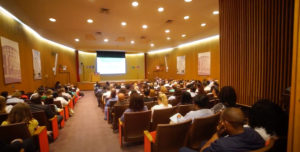Welcome to the Hematology and Medical Oncology Fellowship
The Division of Hematology/Oncology in the Department of Medicine sponsors a fully accredited 3-year combined fellowship with a total of 9 positions, leading to eligibility for board certification in both hematology and medical oncology.
 Fellows obtain practical outpatient experience in hospital-based faculty practice, community-based private practice, and Health Maintenance Organization (HMO) practice settings.
Fellows obtain practical outpatient experience in hospital-based faculty practice, community-based private practice, and Health Maintenance Organization (HMO) practice settings.
This provides the trainees with an opportunity to sample the different styles of practice they can choose from upon completion of their training.
The Hematology and Medical Oncology Fellowship experience
The fellowship provides a unique opportunity to develop the necessary skills to address the needs of patients with hematologic and oncologic diseases. These include a weekly bio-psychosocial conference, covering topics such as physician-assisted suicide/euthanasia, ethics, hospice, effects on families and caregivers, ethnicity, economics, communication skills, advanced directives, team approach, spirituality, pain, depression, delirium, medical futility, and other end-of-life issues.
The pain and palliative care rotation addresses care for the terminally ill patient. Rotations in radiation oncology, blood banking, pathology, and other disciplines intimately linked to hematology/oncology are also part of the curriculum. A bone marrow transplantation rotation is offered in collaboration with Mount Sinai Medical Center in Manhattan. This rotation offers formal instruction and clinical experience in allogeneic and autologous bone marrow and peripheral blood stem cell transplantation and the nature and management of post-transplant complications.
Fellows attend Weekly Core Curriculum and Basic Science Conferences, as well as an integrated series of 146 lectures presented by members of the faculty. The monthly activities include Journal Club, Research Seminar, Pathology Conference, Fellows’ Presentation, Guest Lecture Series, and the Mortality and Morbidity Conference, in addition to a weekly Tumor Board and Peripheral Smear and Marrow Review.
Research
Fellows are required to participate in supervised research in all 3 years of the program. During the 3 years, there is protected research time, which is 1 month each in the first 2 years and 3 months in the 3rd year.
The curriculum includes the following aspects:
- Didactic lectures on molecular biology, cellular biology, immunology technology used in tumor diagnosis, didactic lectures on designs, and analysis of clinical trials
- Every fellow is required to develop a research project of his own, either retrospective study or prospective study, and will be mentored for every step of the project
- Fellows interested in bench research are given hands-on experience in the lab
- Fellows will participate in the daily operations of various clinical trials in the Cancer Center. They are also responsible for patient accrual, obtaining informed consent on trial evaluation, decision making for further protocol treatment or on dose reduction, and treatment of side effects and toxicities
- Fellows interested in developing a research career are highly supported for applications for internal and external research funding and allotted more protected research time
At the end of the 3-year training, fellows should be familiar with conducting clinical trials as principal investigators, designing and conducting research studies, and understanding the principles of basic research techniques.
The future of medical care is you
Our program strives to provide the best educational experience in an environment that balances academic and clinical activities. We take great pride in our success in preparing residents to become the next generation of expert practitioners. For more information, contact Yiwu Huang, MD, Program Director at (718) 765-2600.
Apply to the Hematology and Medical Oncology Fellowship Program today!


